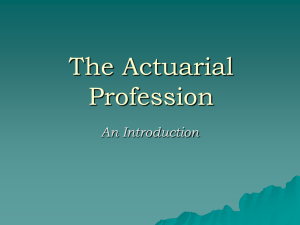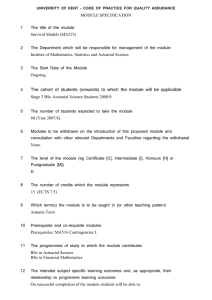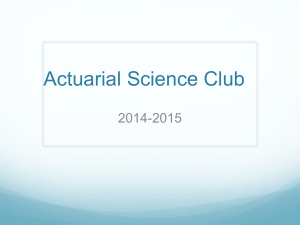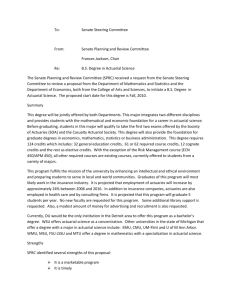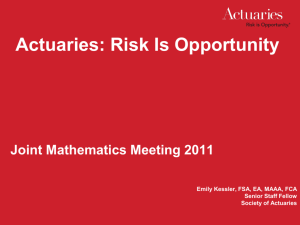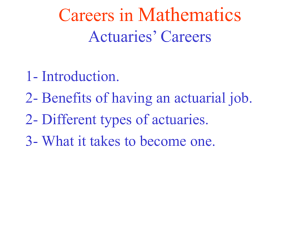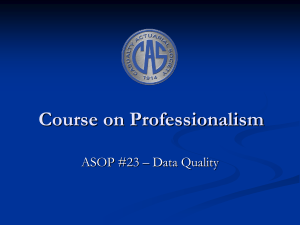Lecture Notes 1 - University of Illinois at Urbana
advertisement
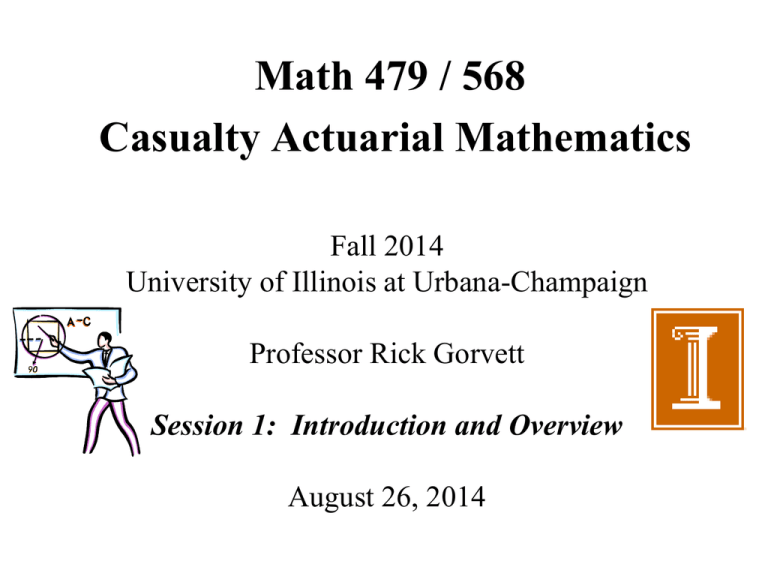
Math 479 / 568 Casualty Actuarial Mathematics Fall 2014 University of Illinois at Urbana-Champaign Professor Rick Gorvett Session 1: Introduction and Overview August 26, 2014 Agenda • Syllabus • Moi • The actuarial profession • The casualty actuarial profession • The P/C insurance industry Syllabus • Course goals and context • Class schedule – Readings – Exams – Assignments • Projects and “Engagement” • Grading Syllabus (cont.) • “Engagement” – This is a participatory course • Elements – Class participation – Current events – Case studies – Small projects – Social media (e.g., Twitter) Me • MBA and PhD in Finance • FCAS, ASA, CERA • Former practicing casualty actuary • CAS Board of Directors • Editor-in-Chief, Variance (I wish…) What is an Actuary? The Technical Definition • Someone with an actuarial designation • Property / Casualty: – FCAS: Fellow of the Casualty Actuarial Society – ACAS: Associate of the Casualty Actuarial Society • Life: – FSA: Fellow of the Society of Actuaries – ASA: Associate of the Society of Actuaries • Other: – EA: Enrolled Actuary – MAAA: Member, American Academy of Actuaries What is an Actuary? Better Definitions • “One who analyzes the current financial implications of future contingent events” - p.1, Foundations of Casualty Actuarial Science • “Actuaries put a price tag on future risks. They have been called financial architects and social mathematicians, because their unique combination of analytical and business skills is helping to solve a growing variety of financial and social problems.” - p.1, Actuaries Make a Difference Membership Statistics (Nov., 2012) • Casualty Actuarial Society: – Fellows: – Associates: – Total: 4,015 1,614 5,629 • Society of Actuaries: – Fellows: – Associates: – Total: 14,187 9,111 23,298 Casualty Actuaries by Type of Employment • • • • • • • • • Insurance companies: Reinsurers: Consultants: Organizations serving insurance: Brokers and agents: Government: Academic: Other: Retired: 2,550 546 890 318 120 93 24 738 350 CAS Exams – Advanced Topics • • • • • • • • • Ratemaking Loss reserving Regulation Financial reporting Estimation of liabilities Enterprise risk management Insurance company valuation Advanced ratemaking Financial risk and rate of return Exam 5 Exam 6 Exam 7 Exam 8 Exam 9 History of the CAS • Founded in 1914 – (Big plans for the centennial in NY, Nov. 2014!) – Initial concern: workers compensation (introduced in 1911) • Functions: – Membership standards (e.g., exams, code of conduct) – Communications with public – Seminars, research • In academia, still the minority presence Traditional Actuarial Functions • Loss reserving – Co.’s policyholders have had “occurrences” (or “incidents” or “claims”) – Actuary determines the aggregate dollars that will ultimately be paid out on those occurrences • Ratemaking – A “risk” (or “insured” or “policyholder”) has an exposure to loss – Actuary determines the “rate” (cost per unit of exposure) – “Premium” = exposure × rate Recent Developments in Actuarial Practice • Risk & return, and other financial applications – E.g., ROE, ALM, insurance securitization • Dynamic financial analysis – An approach to modeling the interaction between insurance and financial operations • Enterprise risk management – Holistic approach to identifying, quantifying, and managing risk Other Emerging Developments • Statistics – Predictive modeling – Big data • Modeling – Catastrophe – Behavioral • Financial reporting and regulation How Well Do We Do All This? • “Insurance Actuaries – A Crisis of Credibility” – Issued by Standard & Poor’s, November, 2003 • Some quotes: – “Perpetual additions to reserves are an indication that all is not well with insurers’ assessments of their future payouts, but it is time to examine how actuaries contribute to the problem, according to Standard & Poor’s analysts.” – “ ‘Actuaries are signing off on reserves that turn out to be wildly inaccurate,’…” – “ ‘ …reserve shortfalls don’t just happen overnight. What happened to all the reserving opinions signed by actuaries in prior periods?’ ” The Actuarial Profession’s Response • CAS – Memorandum summarizing visit with S&P: “S&P acknowledged that they deliberately used flamboyant language in the article in order to get the attention of the reader. As strange as it seems, they say they did not want to impugn actuaries. In fact, their concern is that the voice of the actuary (internal or external) is not being heard by company managements.” • AAA news release: S&P report is “fundamentally flawed.” The Property / Casualty Insurance Industry • Industry facts and numbers • Companies • Lines of business • Very nice resource: Insurance Information Institute (iii) website – www.iii.org Next Time • Risks and Risk Theory • Risks and risk management – Description of “risk” – Management of risk – Control and financing of risk • Risk theory – Utility theory – Ruin theory – Solvency issues
